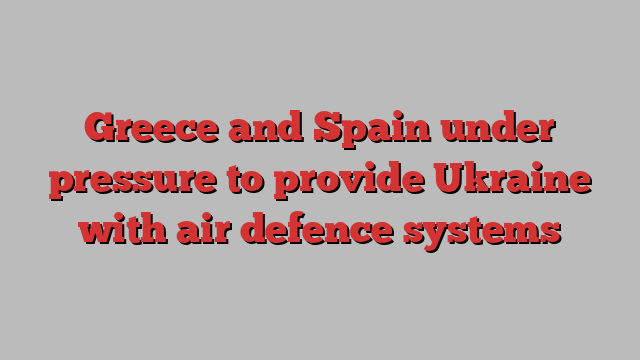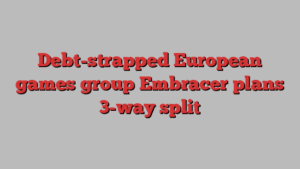
Stay informed with free updates
Simply sign up to the War in Ukraine myFT Digest — delivered directly to your inbox.
Greece and Spain are under intense pressure from their EU and Nato allies to provide more air defence systems to Ukraine, as Kyiv prepares to demand more aid at a meeting of EU foreign and defence ministers on Monday.
Kyiv this month made an urgent plea to western allies for seven additional air defence systems, such as US-made Patriots or Soviet-developed S-300s, as Russia steps up an air and missile campaign against the country’s cities and power infrastructure.
Ukraine’s President Volodymyr Zelenskyy wrote on X on Sunday: “Patriots can only be called air defence systems if they work and save lives rather than standing immobile somewhere in storage bases.”
Only Germany has announced a shipment, of one Patriot system.
Other EU leaders used a summit in Brussels last week to personally urge Spanish and Greek prime ministers Pedro Sánchez and Kyriakos Mitsotakis to donate some of their systems to Ukraine, according to people briefed on the discussions.
The two leaders, whose armed forces possess between them more than a dozen Patriot systems plus others such as S-300s, were told their need was not as great as Ukraine’s and that they did not face any imminent threat.
“We all know who has them, we all know where they are, and we all know who really needs them,” said one of the people.
Asked on his way into the Monday meeting whether Spain had been asked to donate Patriots, Josep Borrell, the EU’s chief diplomat, told reporters: “We have been asking all member states to do whatever they can in order to increase the air defence capacity of Ukraine.”
Officials said less pressure was being put on Poland and Romania, which also have Patriots, to consider shipments to Kyiv given their more vulnerable location on the border with Ukraine.
Ukraine at present has at least three Patriot systems, including one supplied by the US and two from Germany, before Berlin’s announcement last week.
Kyiv also operates long-range surface-to-air missile systems developed by the former Soviet Union, including the S-300 and S-200 systems. A converted and updated version of the latter was used to down a Russian Tu-22M3 long-range strategic bomber over Russia’s Stavropol Krai region last week, according to Ukrainian officials.
Air defence interceptors are likely to be included in the new US assistance package approved by the House of Representatives on Saturday.
The pressure to donate systems will intensify at a meeting of foreign and defence ministers of the EU’s 27 member states in Luxembourg on Monday, officials said. Kyiv is understood to be particularly interested in Greece’s ageing S-300 systems, which Ukrainian forces already have in their arsenal and are experienced with.
“There are countries that are not in an immediate need of their air defence systems, to be very honest,” said one EU diplomat involved in the preparations for the meeting. “Each country is being asked to decide what it can spare.”
The defence ministries of Greece and Spain declined to comment when contacted by the Financial Times. Sánchez said after meeting Zelenskyy last month that Spain would “deliver new capabilities in 2024 to help Ukraine defend itself against Russian aggression”.
Nato secretary-general Jens Stoltenberg said on Friday that he expected new pledges of air defence supplies “will be announced soon” but did not provide any details of the countries or weaponry involved.
Nato has conducted an audit of the air defence capabilities its member states possess and where they are deployed, Stoltenberg said, adding that “this mapping confirms that there are systems including Patriot systems available to be provided to Ukraine”.
Stoltenberg spoke after a virtual meeting of Nato defence ministers and Zelenskyy assembled to discuss the air defence shortages.
The foreign and defence ministers will also discuss the crisis in the Middle East and Sudan, but Ukraine remains the most critical issue. Ukraine’s minister of foreign affairs Dmytro Kuleba and defence minister Rustem Umerov will join the meeting via videoconference.
“The most important discussion will be to identify what member states can do to support Ukraine’s air defence. That’s the most important thing,” said a senior EU official.

